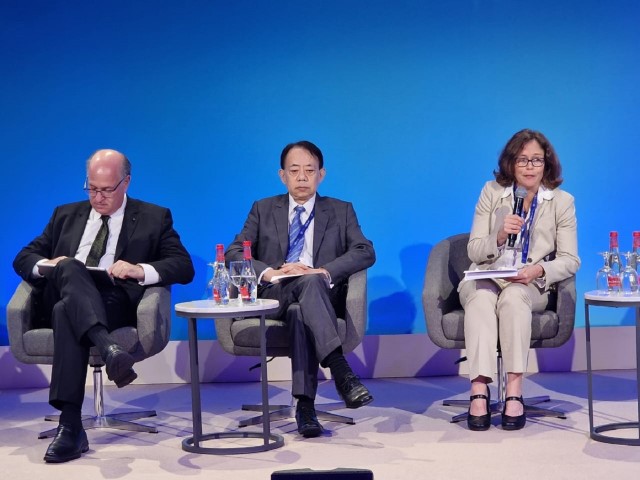
The African Development Bank has pledged to quadruple its financing for climate adaptation to reach $25 billion by 2025 through promoting climate-smart investments
DUBAI: Heads of multilateral development banks attending the 2023 global climate change conference, COP28, have committed to scaling resource mobilization to close the nature and water sector financing gap. The banks shared their views on what can be done differently to ensure that the world delivers on water, nature, and climate agendas. The high-level panel was moderated by Lord Zac Goldsmith, former UK Minister for Climate and Environment, and speakers included representatives from the Inter-American Development Bank (IDB), the Asian Development Bank, and the African Development Bank.
The IDB President, Ilan Goldfajn, shared the institution’s CLIMA pilot program, an innovative financial tool that provides grants to incentivize borrowers to achieve nature and climate objectives. The President of the Asian Development Bank, Masatsugu Asakawa, reinforced the need for the development community to lead in mobilizing partnerships that can generate new and additional financing. Dr. Beth Dunford, Vice President of Agriculture, Human and Social Development at the African Development Bank Group, urged urgent action to achieve Sustainable Development Goal 6 of “clean water and sanitation for all.”
Globally, water resources are dwindling, and impacts are intensifying due to increasing temperatures. By 2030, a quarter billion people will grapple with water scarcity, and by 2050, climate impacts could cost Africa $50 billion per year. Since 2010, the African Development Bank has invested an estimated $7.4 billion in water supply and sanitation services delivery, benefitting about 90 million people in Africa.
The African Development Bank has pledged to quadruple its financing for climate adaptation to reach $25 billion by 2025 through promoting climate-smart investments. The Bank will encourage private-sector funding, particularly for water treatment, recycling, and other components in the water value chain. It will also consider strategic debt relief programs like debt-for-nature swaps in return for a commitment from regional member countries to invest in climate-resilient infrastructure.
The meeting affirmed that there can be no sustainable future without urgent, systemic, and collective attention to the inextricable links between climate change, water crises, and biodiversity loss. Safeguarding water resources and biodiversity should be prioritized as they are crucial in climate strategies. Dr. Johan Rockstrom, Director of the Potsdam Institute for Climate Impact Research and the co-chair of the Global Commission on the Economics of Water, delivered a keynote on “Rethinking the Financial Architecture for Water and Nature.” He called for collaboration in mobilizing finance advancing a conceptual framework and restructuring the overall financial architecture for climate, water, and nature.
The commitment of multilateral development banks to close the nature and water financing gap is a significant step towards achieving sustainable development goals. The African Development Bank’s pledge to quadruple its financing for climate adaptation is a welcome development that will promote climate-smart investments. The urgent, systemic, and collective attention to the inextricable links between climate change, water crises, and biodiversity loss is crucial in safeguarding water resources and biodiversity, which are fundamental supports to human well-being and economies.
(Image Source: African Development Bank Group (AfDB)
